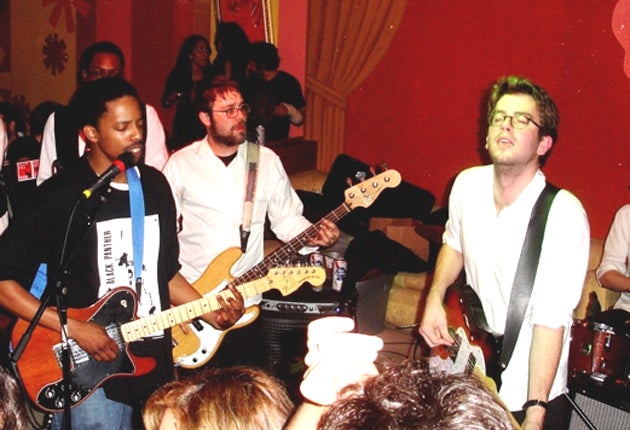Black Joe Lewis and the Honeybears, Jazz Café, London

Joe Lewis is much smaller, more wiry and slippery than his near-namesake, America's iconic heavyweight champ. You can bet the man who was itching to call his first album Nat Turner, after the feared leader of a US slave revolt in 1831, knows tall about Louis. Growing up in a Texas small town, MC Hammer claimed the 28-year-old's affections long before his current heroes James Brown and Lightnin' Hopkins. But the grit of Southern life at ground level hasn't changed too much, and he sings his take on 1960s soul with casual conviction.
Since his co-guitarist Zach Ernst put together their soul revue band the Honeybears and they made that album (Lewis settled on Tell 'Em What Your Name Is!; he figures he'll hit us with the "revolutionary" stuff later), reviews and TV appearances are piling up in the US. And now here he is in London, on his birthday. He'd rather be in Amsterdam ("Nothing but booty and weed there. My kind of town ... "). But this deceptively skilled showman makes the best of it. Lewis frankly seems the weak link in his own band at first, and I wonder why his name's on the bill. But he is gradually revealed as a just-loose-enough cannon to make the others roll, seeming to grow in the centre of the stage.
The Honeybears are a very tight ersatz-soul band, rolling down familiar grooves learned from old Stax discs but never cutting their own. That doesn't negate the beautiful way the self-styled "Jew-Mex" sax and trumpet brass section crest like the sun one minute and cruise over the drums the next, or the quick, uncluttered crescendos they splash over a steady, slow bass beat. The band swing just enough, like a 1960s movie dance-hall scene.
Lewis, self-taught on a guitar he picked up at the pawn shop where he worked aged 19, adds a little necessary mess. His voice is a squeezed, gruff scream which, in every second song, sounds like James Brown singing "Please, Please, Please" at the Apollo in 1962. His guitar sounds like it's scrabbling at the others' music, roughing it up rather than fitting in. He's the deceptive key to everything around him, while Ernst feeds him lines and backs up notes. "That song you wrote for the Queen?" Ernst innocently enquires. Lewis instantly responds: "This one goes out to Queen Elizabeth! It's called 'Bitch I Love You So Much'."
Lewis riffs on our monarch for some time and it's when he talks that you get his cheeky, charming measure. He stage-mutters shaggy dog stories in an inaudible Southern accent when he's not being mildly outrageous, but you get the impression he's keeping back 60 per cent of what would spill out to a home Texan crowd, which the Jazz Café's groove scholars will never resemble. "Living in the Jungle" – "That's where I want to live, when I make some money" – is a good deal more positive than Axl Rose's old illiberal take on the term, and sees Lewis's voice used as pure percussion. He's even better on harmonica; that blues harp may be his real instrument.
"The Ballad of Jimmy Tank", a ripped-from-the-headlines Southern blues about an Alabaman who fatally "went down fighting" against local repo men, touches on the rebel spirit Lewis keeps damped down out of gratitude for any audience paying to see him.
If there was still really a Stax, he might not have made it out of the clubs. But by the end, as he absently waves in his saxophonist while at last lost in his own music, he brings a touch of the Texan roadhouse even here.
Join our commenting forum
Join thought-provoking conversations, follow other Independent readers and see their replies
Comments